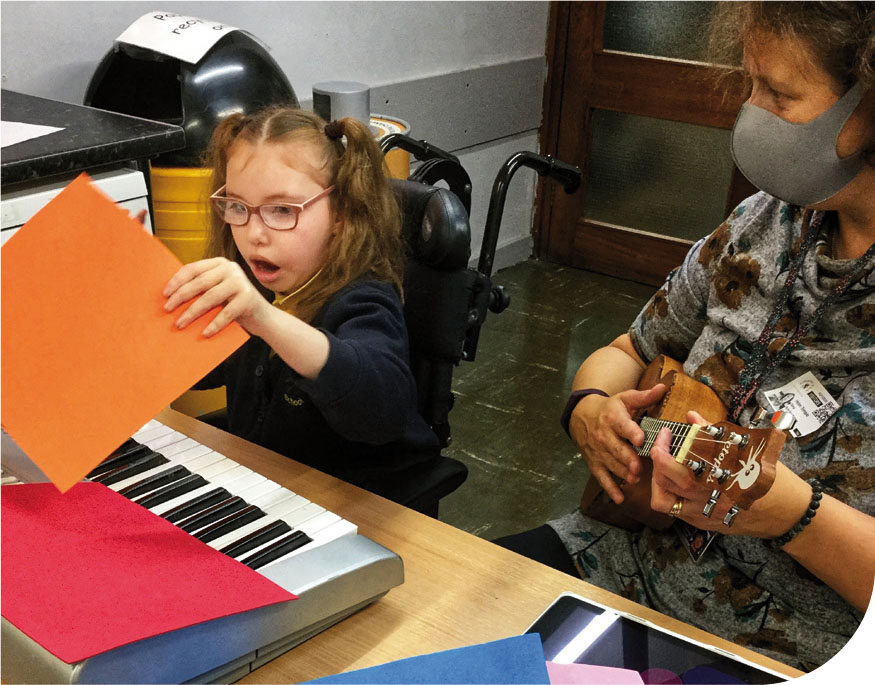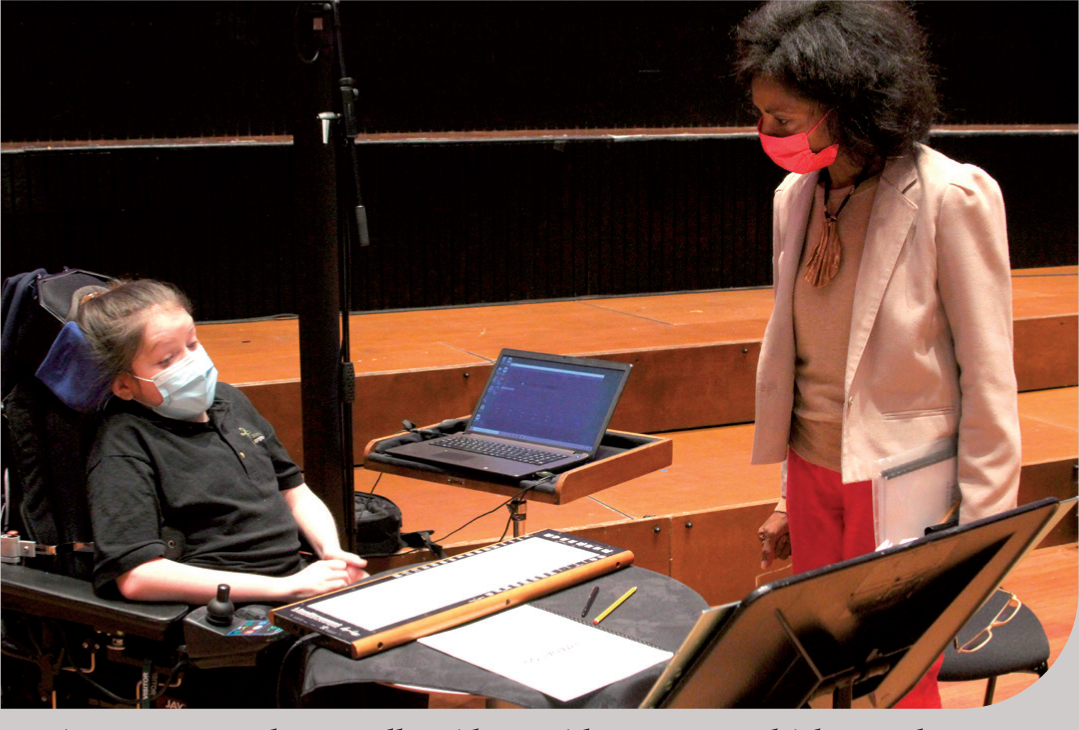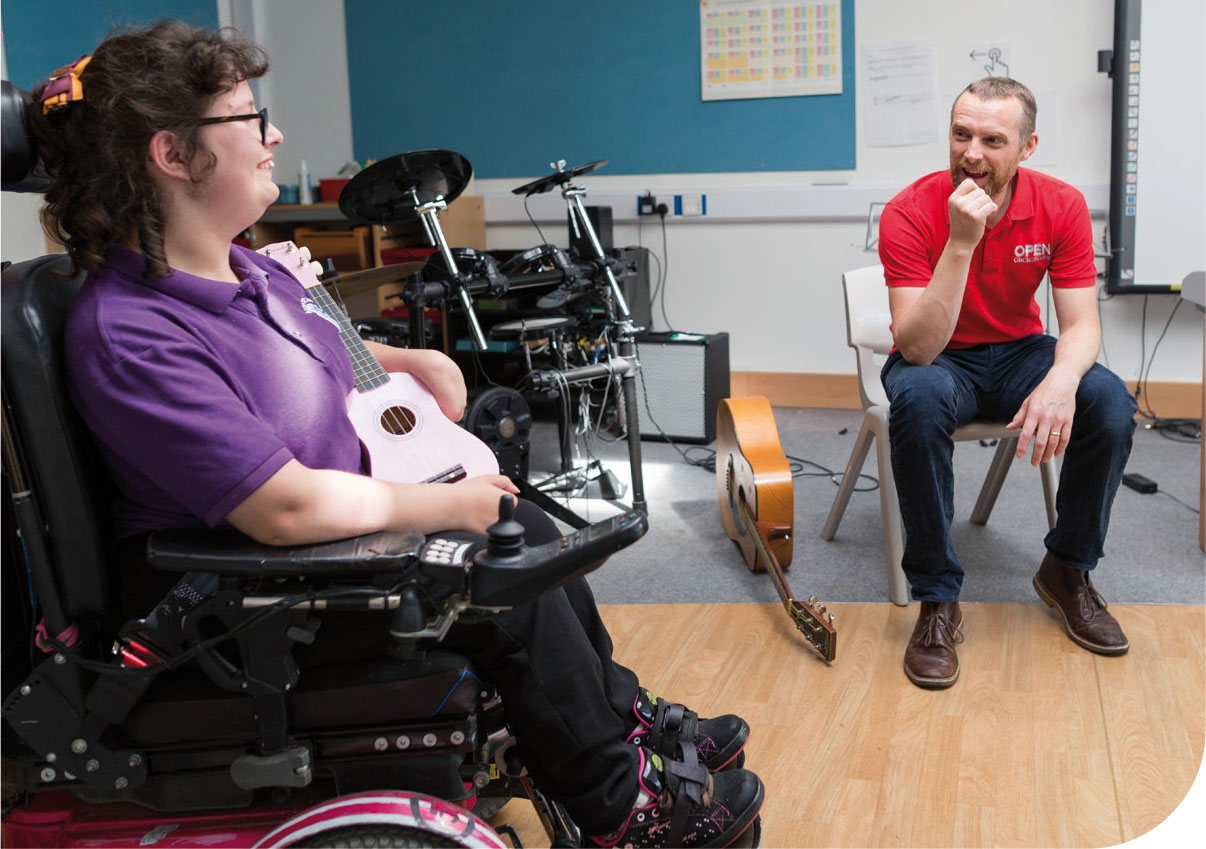
Back in 2018, Dr Marina Gall's research project, outlined in the Bristol University Policy Report Opening up music making for young people with complex and multiple needs, recommended that Open Orchestras should be a central part of the school curriculum in special schools. In the next academic year, there will be 45 Open Orchestras running in special schools around the UK.
Winner of the 2019 Music Teacher Outstanding SEND resource, Open Orchestras is a complete programme that comes with training, accessible musical resources, evaluation, as well as ‘My Orchestra’ – an online community of practice and events. It enables Music Education Hubs, special schools, and arts organisations to set up and sustainably run their own accessible orchestras. Here, educators and students involved share their experiences.
Chadsgrove School
‘We set up our orchestra in 2017 and currently have ten young musicians selected for a wide range of reasons, including their passion for music, their innate musical ability, and a physical disability that ordinarily prevents them from accessing a melodic instrument in the “standard” way. Some of our musicians play the Clarion (an accessible instrument that can be played by any part of the body, including the eyes) while others have selected more traditional instruments such as the violin, keyboard, ukulele, and a variety of percussion.
‘Our first public performance in July 2018 was so memorable and was certainly a special highlight of my career to date; sharing their music for the first time with a live audience felt magical, as the pupils amazed them with their newly acquired skills of taking a piece of orchestral music and reshaping it as their own. The wow-factor did not stop there, as listeners marvelled at their levels of concentration and their ability to listen to one another, play sensitively, embrace silence and be expressive.
‘Being a part of the Open Orchestra programme has had a huge and positive impact on my classroom teaching, with the regular training and sharing of ideas proving invaluable tools that can be utilised across all age and ability ranges.’
Stephanie Wellings, music teacher
‘I use a head tracker and a metal dot on my chin to play Clarion on my computer. At first, I found it hard to control the mouse. With practice, I got much better. Now I can use the on-screen head tracker toolbar to mute and unmute, click, drag, double click, and so on. This means I can edit musical patterns and create new patterns myself. Before I joined our Open Orchestra, I had never used a head tracker, ever, and I found using an Eye Gaze really tiring. Now I use the head tracker not only in music but in all my lessons. It means that I can be independent and do some of my work all by myself. It makes me feel confident. It makes me feel free.
‘I think it is important for schools to give young people the opportunity to be in an orchestra, as it is a chance for them to explore and experiment with how great they can be. My advice is not to be nervous; give it a try and have fun reaching your potential!’
Ibrahim, Open Orchestra musician
Coventry Music
‘Open Orchestras, for me, highlights some of the best music opportunities we can offer. I joined Coventry Music in September 2017 and the highlight of my first term was spending a morning at Sherbourne Fields watching Will, Coventry Music leader, and Ross from the school guide their small group sessions. The pupils really engaged meaningfully with tailored music making. Later in the year, as they became an orchestra of ten, I decided they had to open one of our Summer Showcases.
‘Moving forward to 2021, I still have the passion to grow Open Orchestras. Three schools have been involved, including an amazing group starting in the midst of the pandemic! In Coventry, we have a Hub Inclusion group helping to create pathways that enable young people to really experience the joys of music.
‘None of this happens overnight. Inclusion and access to music are steady processes. We have also learnt not to offer projects, but programmes with the future built in. As we do with any other programme, progression and continuation has to be key for all young musicians. My top pieces of advice for those wanting to embed and develop inclusive music making would be to start small, think legacy before you start, and to seek out advice – there is so much out there.’
Mark Steele, Coventry Music lead
Alfreton Park Open Orchestra

Alfreton Park musician with Helen Temple
‘I liked the drums best. I liked banging them. Playing music makes me smile.’
Kian, Alfreton Park Open Orchestra musician
‘Alfreton Park Open Orchestra has had a huge personal impact on me. I come from a background in mainstream music teaching, and this was the first time I have regularly worked in a special school. I was anxious when I started out, but because Open Orchestras is co-delivered with a member of staff from the school, we were able to learn from each other. My transition into special schools was helped in those early sessions by my wonderful orchestra leader Ruth Woodhouse, whose positive energy, experience and understanding of the individual participants was invaluable.
‘When you start an Open Orchestras programme, you will feel like you are on the biggest learning curve! Initially, it was quite a challenge for me not to be able to plan a lesson as I would in a mainstream setting because the sessions need to be pupil-led and activities more fluid. There is time to explore and discover the participants’ preferences for instruments and the types of sound they enjoy. It's amazing what can happen when you allow space for pupils to musically explore at their own pace.
‘There have been many memorable moments from our first year, but I think the most memorable are the magical ones when the participants’ music making takes you by surprise. For example, one of our participants found it challenging to focus and often moved from instrument to instrument. One day, he suddenly sat down at the keyboard and sang a series of four notes out loud from a score while simultaneously playing the notes on the keyboard. It was absolute magic, and he was so proud of himself. The impacts are wider than the music making.
‘It was a privilege to be able to work with children in smaller groups, allowing time to get to know them as individuals. It also made me more aware of the pupils with SEND in my mainstream classes and how I could help improve their access to music making. I would definitely encourage music teachers to take part in an Open Orchestras programme if they have the opportunity.’
Helen Temple, area leader of music development, Derby & Derbyshire Music Partnership
A closer look: Sally Kidson, LinnStrument player

LinnStrument player Sally Kidson with composer Shirley J. Thompson
‘As a disabled musician, I'd never have seen myself playing with an orchestra, as I simply thought I was just not good enough. I could play a few chords on the piano, and that was it. I am proud of having learned the LinnStrument from the ground up. Now it's become like second nature to me,’ says Sally Kidson. Kidson, now a member of the National Open Youth Orchestra which she first joined as a trainee, was invited to perform with professional ensemble BSO Resound (Bournemouth Symphony Orchestra Resound) for their June concert. This featured the world premiere of Shirley J. Thompson's Emanation – a brand-new piece commissioned to reflect on 60 years of change for disabled people.
Kidson's musical journey started at Treloar's Open Orchestra, where she'd previously taken part in workshops with BSO Resound. Treloar music teacher Jocelyn Watkins says: ‘None of the traditional instruments suited the movement Sally could physically manage, and this prevented her from reaching her musical potential. The LinnStrument's more accessible keyboard layout provided her with the opportunity to take part with any musical group and develop her performing skills to a professional level.
'At Treloar, we started with Open Orchestras around six years ago and it has completely transformed the way I teach. Whereas traditional instruments require you to adapt your body and physical movements to them to produce a sound, accessible instruments can be adapted to your access needs and musical preferences. With regular training in class and orchestra sessions, our amazing and supportive staff have become as proficient at using the Clarion and adapting it for students as the music department staff. One of the most exciting aspects of it is the progression route: students can progress to play pieces that are complex, emotive, and large scale. I am so proud to be part of Open Orchestras and see the benefits to my students every day; the improved confidence, the increased wellbeing and the fun that can be had from taking part in group music.’
‘Open Orchestras is an adventure in music, in teaching, in playing. It's something the whole school can cheer on and be proud of. For young people, it's the opportunity to explore instruments in their own way, making social connections that many young disabled people can find hard to access. For the staff, you're developing your practice by building your orchestra around the needs of your musicians, rather than having to adapt to instruments and repertoire as traditional orchestras do.
‘The pieces we provide are broken down into musical building blocks that can be reimagined into whatever your students want it to be. No two orchestras are the same, playing music that is consistently striking in its originality and creativity. Leading an Open Orchestra is a brilliant professional challenge. You're not on your own; you're connected to a supportive community of practitioners sharing tips and experiences. Open Orchestras changes everyone's perceptions of what can be achieved, and that includes parents and guardians who may be seeing their child play music for the first time.’
Jonathan Westrup, Open Orchestras education manager

Jonathan Westrup with an Open Orchestra musician
Greenvale & Lewisham Music Open Orchestra
‘Opportunities to develop creativity and opportunities for student voice are both really important for all our students. Our Open Orchestra is an amazing group of both staff and students who rehearse together weekly. Our Open Orchestra first started at Greenvale School in 2018, however due to the impact of COVID-19, the orchestra has had a hybrid approach since March 2020, with sessions online and in school. We then moved to working with students from different pathways in pairs or small groups within their “bubbles”.
‘The groups have really worked well together musically; no words are needed, the group just “play” and so everyone is included, the music just happens. Students can listen and join in when they want, this enables all students to share their voice musically. Sessions vary each week and are very much student-led, so can be very loud and rocky, or more relaxed with a chilled-out vibe. Creativity is encouraged for everyone – for example one student might compose a simple melody on the piano, and then others in the group (both staff and students) will take up this melody and jam along.’
Liz Smith, deputy headteacher and music coordinator, Greenvale School
‘Open Orchestra is all about trying to get everyone in the room to express themselves comfortably in some way, whether they're playing or not playing.’
Arthur Lea, Greenvale music enrichment teacher
‘Everyone is having their own experience in the room together.’
Jacob Rosenberg, Lewisham Music tutor
‘Open Orchestras is a perfect example of how partnership working and co-design can create the best outcomes from the young people we serve. The inclusive way of working and blending of “traditional instruments”, voices, and technology is particularly innovative and something which inspires us with new approaches to all our offer. We are excited about the potential to create other satellite Open Orchestras in the borough.’
Charly Richardson, chief executive, Lewisham Music
When asked ‘Orchestra is…’, KS5 students said:
‘Amazing’ because ‘I like to play the piano’.
‘Exciting because you can make up different sounds and you can play different music.’








